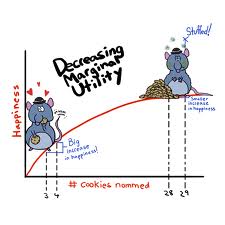- Marginal Utility: The additional satisfaction a consumer [or society] gains from consuming one more unit of a good or service.
- Law of Diminishing Marginal Utility: A law of economics stating that as a person [or society] increases consumption of a product – while keeping consumption of other products constant – there is a decline in the marginal utility that person derives from consuming each additional unit of that product.
I told myself I wouldn’t get into the government shutdown on this blog, but here I am. However, I promise this post is not meant to be political or an attack on Republicans—I’m trying to teach some economics here!
Finding themselves in the hotseat for the government shutdown, Republicans began passing piecemeal legislation to fund particular government programs (Some in G.O.P. Try to Pick and Choose Amid Spending Fight, New York Tmes, Oct 5). I found their choices to reveal truths about government (especially government spending) that they don’t often voice. More importantly, we have a great economic framework to describe them!
Imagine you are tasked with creating the budget for the current fiscal year to take effect as soon as the shutdown ends. It’s all up to you—but here’s the caveat: they have haven’t actually told you how much money they are going to authorize. What do you do?
If it was me, I’d make a list. Start with the federal programs that give you the most bang for your buck—the most benefit, or utility, per dollar—then work my way down. Not knowing when the money would run out, I would make sure the good ones are right at the top. What would your list look like? Maybe something like this:
- “Fully fund the National Institutes of Health”
- “Supplemental nutriton program for women, infants, and children”
- “National parks”
- “Nutrition for the impoverished”
- “Guarantee that federal workers…will receive back pay once the government reopens”
- “The Smithsonian Institution”
- “Funding the V.A.”
- “Head Start classrooms”
- “Finance border security and enforcement”
- “Nuclear weapons security and development”
- “Indian education and health services”
- “The Food and Drug Administration”
- …continue the list…
This is basically list offered so far by House Republicans. My own list would have included “Obamacare” up there somewhere, but hey, that’s just me. So it appears that Republicans are picking and choosing from last year’s budget like it was an all-you-can-eat buffet, but the analogy gets better. Finding definitions to introduce the concepts in this post, I noticed Investopedia’s follow-up explanation for the Law of Diminishing Marginal Utility:
“Say you go to a buffet and the first plate of food you eat is very good. On a scale of ten you would give it a ten. Now your hunger has been somewhat tamed, but you get another full plate of food. Since you’re not as hungry, your enjoyment rates at a seven at best. Most people would stop before their utility drops even more, but say you go back to eat a third full plate of food and your utility drops even more to a three. If you kept eating, you would eventually reach a point at which your eating makes you sick, providing dissatisfaction, or ‘dis-utility’.”
But like a buffet, however, you’re not just glopping generic “government spending food” onto your budget plate. You pick your favorite foods first, and fill the white space on your plate with the next-best choices. As you fill your plate, the marginal utility of each item decreases. Why? Because you’ve already picked the best ones! In Congress, it’s obviously not that simple. Politics and differing opinion of which programs are actually valuable means some good programs face cuts, while other less useful pet projects get funded.
So the Republicans have picked made their “best” picks, and I find it fascinating that they chose many programs that they were trying to defund weeks earlier. I think the shutdown forced them to come face to face with their anti-“big government” platform to see what happens when these institutions aren’t in place. If there’s a silver lining in the shutdown, it is that it served as a reality-check for lawmakers to see what government services people actually rely on and care about. To be clear, I don’t think this is a responsible way to finance the government. But I do think it is a positive way to start conceptualizing how the government provides services to the public, and we need to keep telling Congress to line up the programs it funds with the benefit they give to the country.
I have to say, I can sympathize with Republicans when it comes to the inefficiencies of government bureaucracy. Perhaps our tax dollars could be better spend. But I think it is better than the alternative, and I find it hard to make the case that we need less spending when so many quality programs run on a shoestring budget and there is so much more room for investment in public goods (top of my personal “marginal utility” list: public education, modern public transportation, fixing failing bridges and infrastructure…). If there is room for common ground between the poles of the political spectrum, I think it lies in closer consideration of the actual utility of government programs, not sweeping statements about government spending. If we think critically about the specific services provided by the government, I think we’ll all have a better idea of just how big the government should be.

